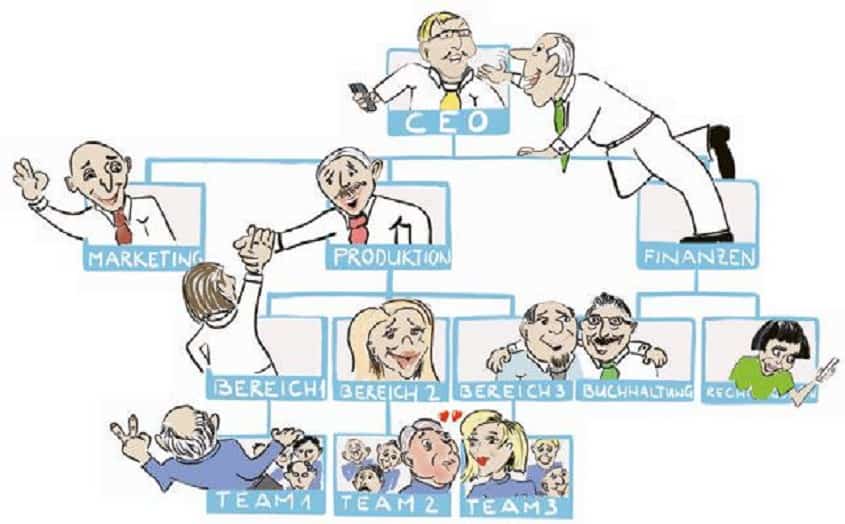Hannes introduces the "you-culture"
The first management meeting after the long summer break took a long time. Hannes had been aware of this beforehand, came well prepared and had also presented clear plans as to how the efficiency screw could be turned a little in production in the second half of the year in order to make up some ground on the endangered profit margin. A challenging undertaking, especially as the markets are also sluggish.

Team spirit with the new CEO committed. Far-reaching decisions such as shift reductions or renting out machine lines to partner companies are now balanced out in the management team. Decisions are then made jointly. The lone wolf approach has had its day. Hannes likes that, because it takes a lot of pressure off him as production manager.
Hannes' motions were discussed. "Discussed" means: everyone gives their two cents, even though they have no idea whatsoever about technology, production, Kaizen and CIP. The most that is decided is that it has not yet been decided. Votes like "in my opinion Hannes has to go over the books again" are the pretended arguments for not making important decisions. This is fun: everyone talks along, no one wants to bear the consequences. The management mutates into a copy of political bodies in the country.
A decision is made - now it's time to say "you".
But today Hannes was wrong. The HR Division actually suggested that the team climate should be further promoted in a targeted manner. After all, good motivation contributes more to increasing production than digitally optimised control of a production line. The colleagues are enthusiastic. Together, they decide that the program should be called "Promoting the company culture through more motivation in the team" and, above all, that it should cost nothing. The CEO, who likes to describe himself as a "doer", decides that the "you culture" should simply be introduced. It's quick, it works quickly and it costs nothing. The board nods this off and gives Hannes the task of planning the implementation. This is not exactly what Hannes had hoped to get out of this meeting, but he has no choice but to get behind it.
The devil is in the details
Back in his office, he begins to draft the appropriate directive. From now on, everyone should say "Du" to each other, regardless of hierarchy. This is modern and shows openness and open-mindedness. His thoughts take on a life of their own: It feels like hierarchies are being abolished in this way, only to be cultivated even more strongly through the back door. But what does "as of now" mean here? "As of now" is not possible, he thinks. What about those who are now on vacation or on a business trip? They will return next Monday and will be addressed by their employees as "Du". That's too abrupt. So there has to be a cut-off date. He begins to fine-tune the directive.
Hannes defined: From 1 October this year, the "you culture" will apply. And because people in three-shift operation are also affected, the time 00.00 is also defined. At the beginning of the shift, the area manager still greets people with "Good evening Mr. Meier", and says goodbye with "Bye Matthias". This only seems a little grotesque and stilted at first glance, but the group feels most intensely how serious the management is about the topic of "appreciation".
Nevertheless, Hannes knows from the CFO, for example, that he has a hard time saying "you". Actually, many people do. No wonder, because the industry and especially the company were clearly hierarchical. It still is today, because there are departments in which even long-standing colleagues still say "you" to each other. But that's all over now. "You just have to rethink," Hannes says to himself and underlines the obligatory passage for everyone in the directive. But resourceful as he is, he still creates a small linguistic emergency exit.
The saving transition phase
For those who have trouble switching from "Good morning Mr. Meier, have you been able to write the report yet?" to the jovial "Hello Bruno, have you finished writing the script yet?" in a transition phase of six months, there's an alternative. "Good morning, how's it looking, is the report ready yet?"
"That's good," Hannes thinks, and is once again proud to have found the qua-drature of the circle. In addition, the company meets further hurdles in gender-neutral wording. If you don't address people with "Sie" or "Du", but only talk about Sa-chen, you can no longer confuse "Frau" and "Mann" as well as "Sie" or "Du". This is truly a monumental step in the continuous improvement process.









